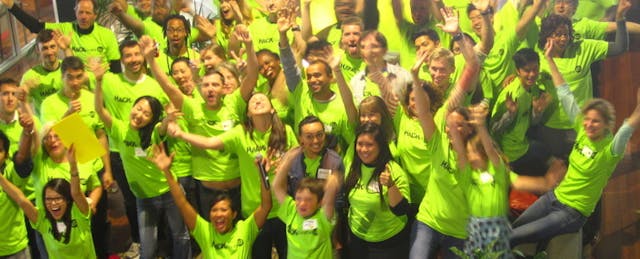Hackathons have tried to jumpstart companies, address "achievement gaps" and even spur thinking about new schools models. Now a group of educators have tried to turn the classic hackathon inside out by asking schools: "What do you need?"
HACKtivate ED, hosted by four Education Pioneer Analyst Fellows, sought to bring together educators, developers, designers, and data analysts to design solutions for real world problems in the education sector. Representatives from Oakland Unified School District, San Francisco Unified School District, and Aspire Public Schools, showed up to share real-world problems and consequently made this past weekend’s HACKtivate ED event different from most others.
Code for America supplied the space; the school districts supplied the challenges to solve, and coaches, including Julie Bai from Pearson Education provided the encouragement. The event was also supported by premiere sponsors Education Pioneers and Activate ED. By the end of the weekend, nine teams pitched their solutions to a panel of judges and district representatives, with the hopes to win their hearts, solve their problems, and earn up to $2,000 and the chance for an in-depth coaching session with NewSchools Venture Fund.
How it begins
The hackathon officially started on Saturday morning, with partners, participants and coaches mingling hesitantly over coffee and green blended beverages as they got to know each other. The 80 participants hailed from a variety of backgrounds: 40 percent developers, 25 percent data analysts and 20 percent educators.
HACKtivate ED welcomed newcomers like Terry Lai, a Middle School Librarian from A.P. Giannini Middle School in the SFUD, who admitted, she initially “felt intimidated and almost didn’t come,” assuming she was “too old” for these kind of events. In emailing with the organizers, she was reassured her experience would be highly valued. Jaymes Hines, founder of Startup EduTech said he joined the hackathon because he believes “the next big idea in education will take place at the hackathon level.” There to steer them toward this “next big idea,” were coaches Bai of Pearson, Amy Lin, of Edcanvas, Breanna Digiammarino of IndieGoGo, and Sam Chaudhary of ClassDojo.
HACKtivate ED was the brainchild of Education Pioneer Analysts Chian Gong, Han Hong, Roxanne Phen, and Thu Cung. Outside of their full time jobs supporting organizations like Students First, Oakland Unified School District, Aspire Public Schools, and San Francisco Unified School District, their fellowship required them to organize a community engagement project. While most others in their program were doing direct service work with specific schools, Gong, Hong, Phen, and Cung choose to try inspiring 80 newly acquainted strangers to come together over the course of 48 hours to leverage technology to improve the quality of education for local school districts in the Bay Area.
“Organizations need help and there is not always a great forum to ask,” Phen says. In planning HACKtivate ED, the team hoped to give organizations the opportunity to present their challenges, and for diverse teams to develop new ideas, prototypes, and relationships around those problems. Alex Bernadotte, founder and CEO of Beyond 12, Ashoka Fellow, and a judge for the weekend, saw the event as “pioneering” in its approach to including organizations that don't usually show up at such events.
“Most [of our] interactions with the design and entrepreneurship community is with sales people," notes John Burke, Supervisor of the Achievement Assessments Office at San Francisco Unified School District. By contrast, this time "[we] get to flip it -- I get to say what I need.”
Saturday morning began with opening remarks from keynote speaker, Scott Morgan, EdPioneer founder and CEO, followed by the school districts presenting nine different problem statements, many of which had most teachers and administrators in the room nodding their heads in solidarity. For instance:
- Aspire needs to develop a real-time referral process to help teachers escalate and immediately address behavior issues in the class;
- Oakland Unified School District Community Partnerships’ need to identify trends in the quantity and type of services provided by their community partners so they can address areas of inequity and find ways to be better partners.
Teams formed quickly around the problems and the “hack-tivities” began.
Winning hacks
Working through the night, the teams developed analysis and prototypes that they could present the next morning to a panel of judges that included Bernadotte, Michael Staton of Learn Capital, and Shauntel Poulson of NewSchools Venture Fund.
Teams had five minutes make their pitch. The “Best Overall Analysis” and “Best Overall App” would take home prizes of $1000 each. Districts would also award $1,000 to the pitch that best addressed their problems. All awards were funded through Education Pioneers and the Broad Center.
Referr ED became the team to beat, with its simplistic yet effective mobile app that completed a behavior referral form with a mere three clicks and a voice recorded message. (The form then went to the central office’s application dashboard to await the student’s arrival.) By contrast, Oak Tree Connect created dashboards to visually represent community partnership data, including an interactive geographic representation for Oakland Unified to easily identify gaps in community partnerships and high needs areas needing more resources.
By the end of the weekend, Referr ED swept the competition, taking home the prize for “Best App,” “Best Aspire Solution,” and a coaching session with NewSchools Venture Fund. Oak Tree Connect won "Best Analysis."
Hugs, high-fives and photo sessions were a delightful end to the weekend. Han told the group that “education partners, like Oakland Unified School District, are ready to use this stuff tomorrow, and that’s when we know we’ve done something good.”
Whether the tools will be built remains to be seen. But as a starter, school leaders felt that they had shared their challenges with a broader community.
Also see: "Would You Rather Go to Hogwarts or Hop on the Magic School Bus?"


